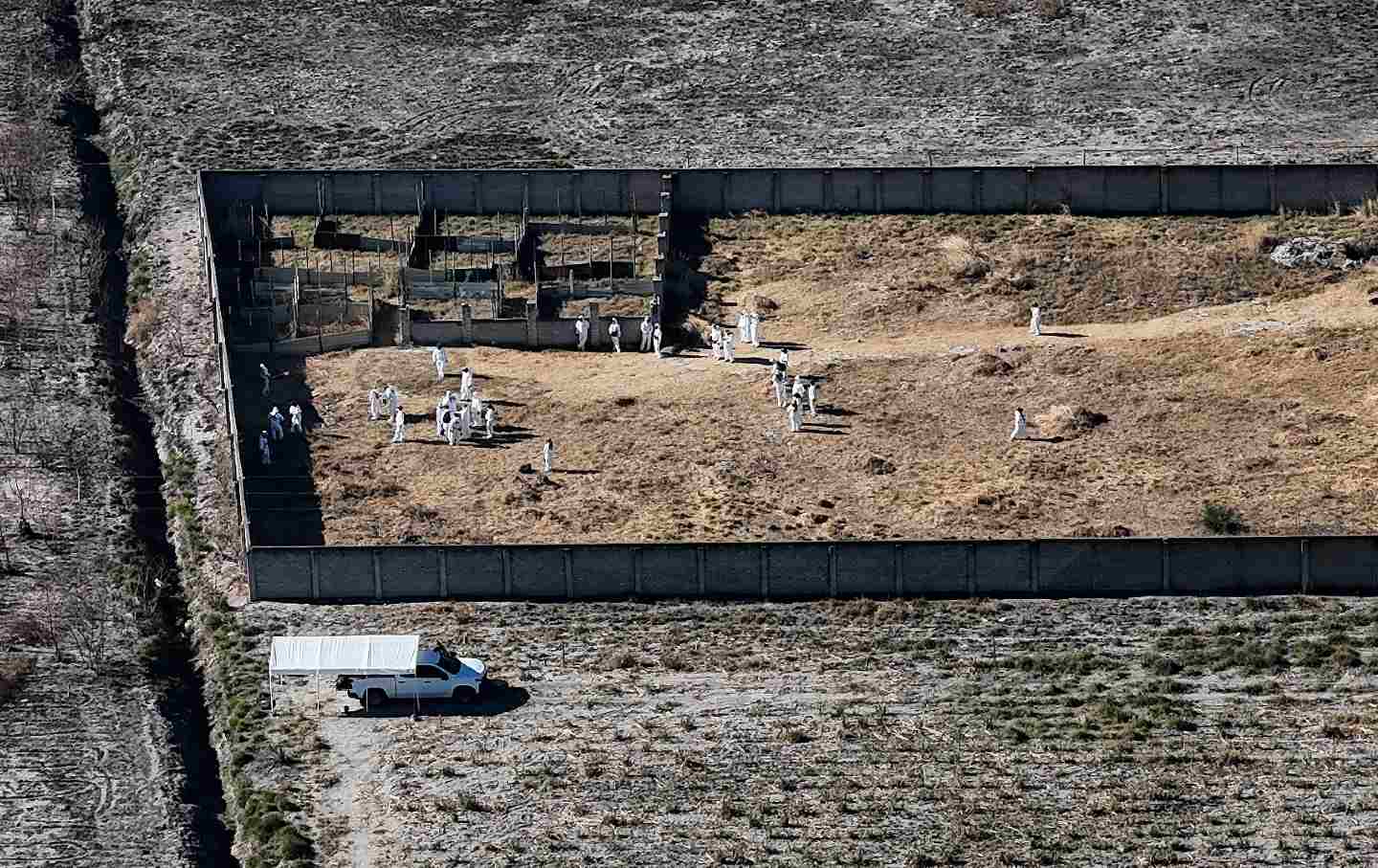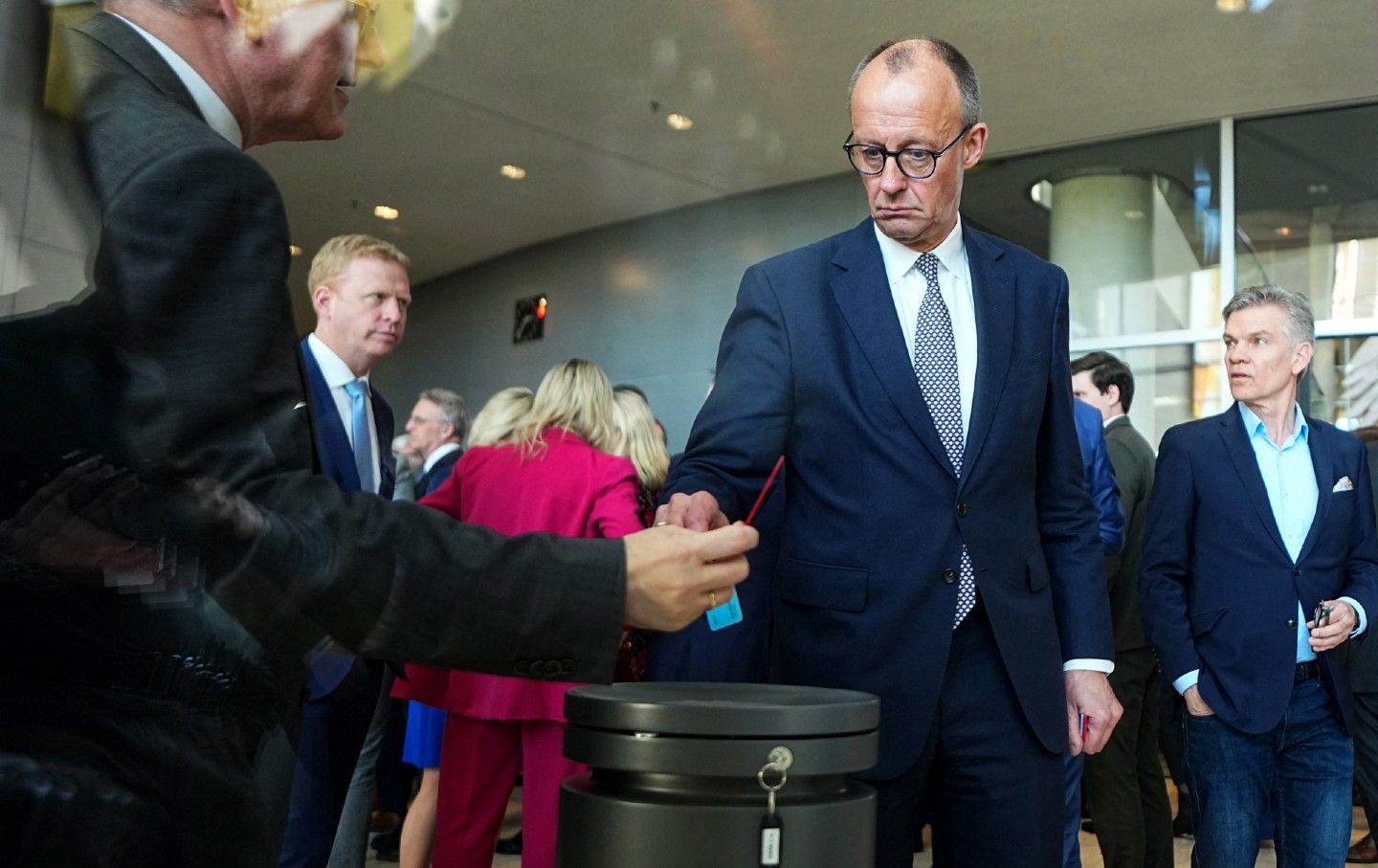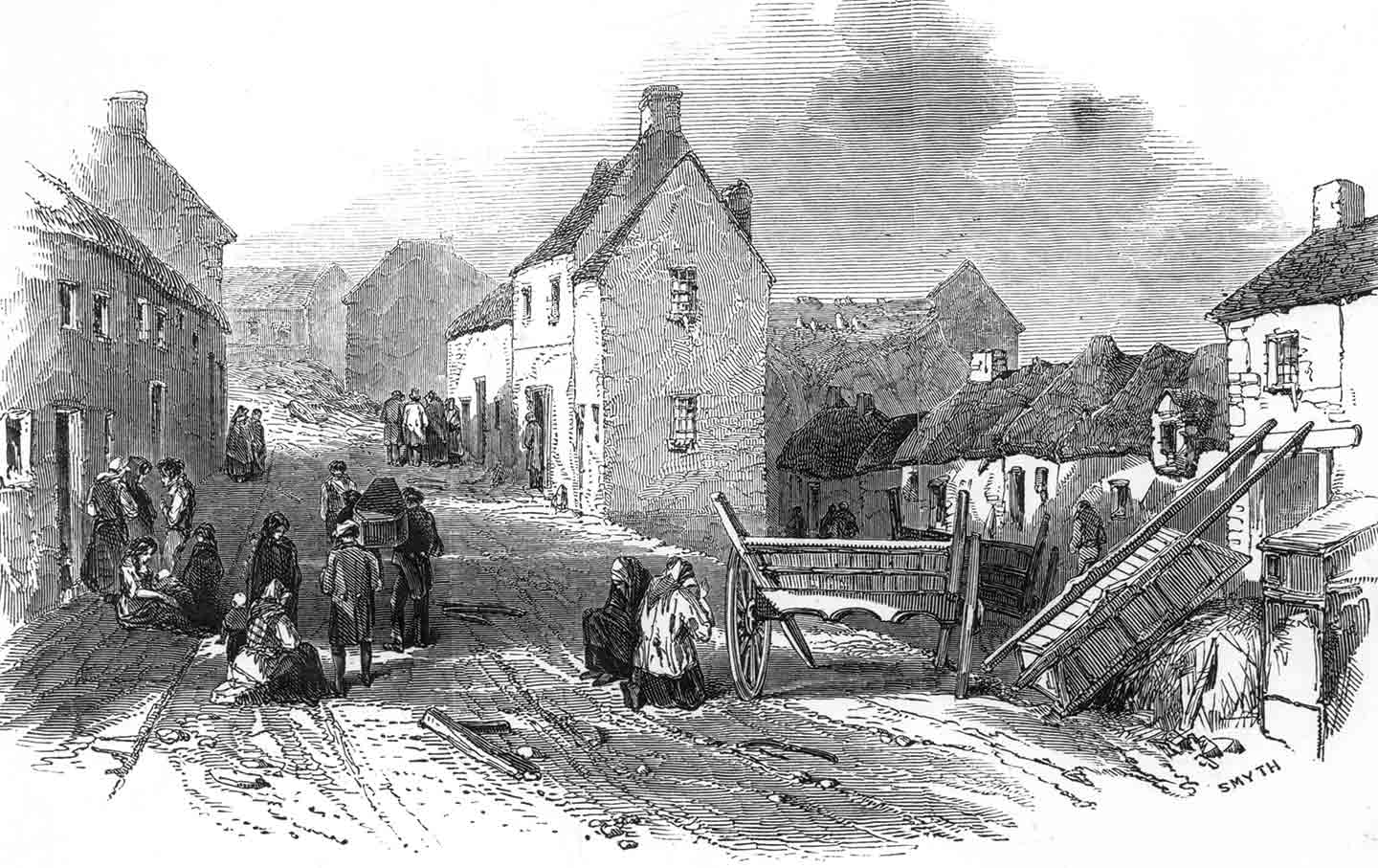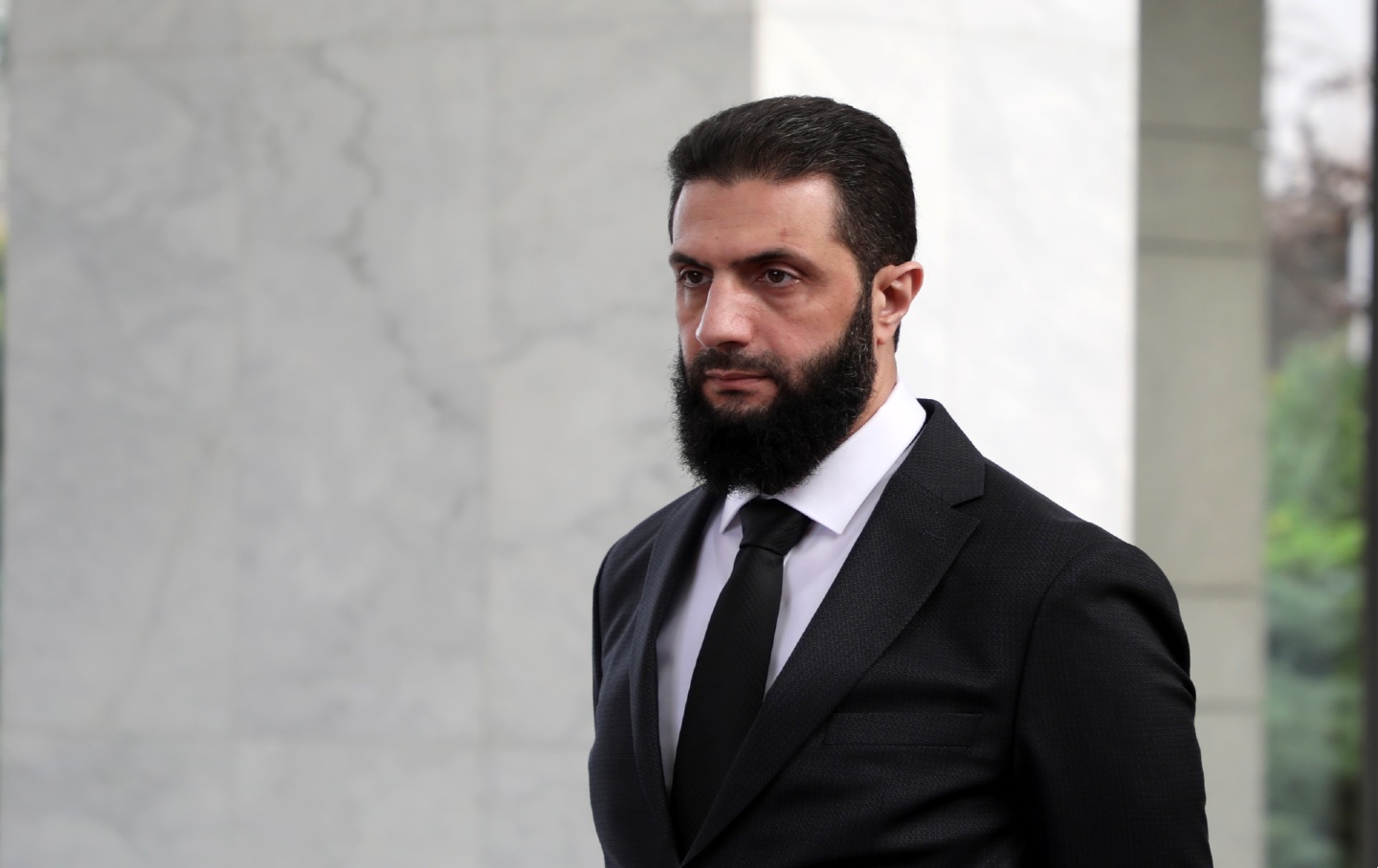How #MeToo Divided NYC’s Chinese Democracy Movement
The Chinese diaspora community is in turmoil over sexual-misconduct lawsuits, involving members of the Tiananmen Square generation and the younger white-paper generation.
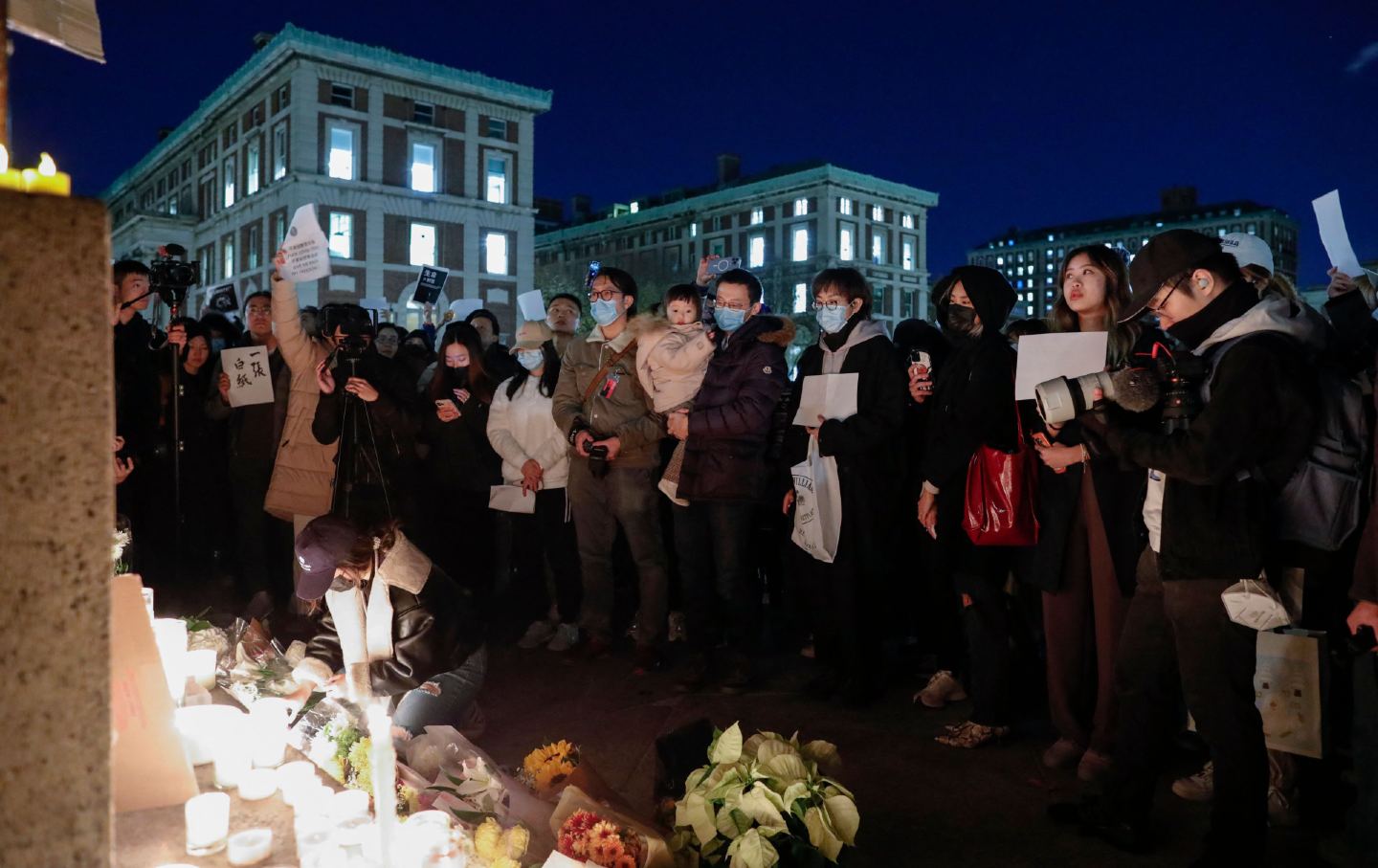
People gather at Columbia University during a protest in support of demonstrations held in China calling for an end to Covid-19 lockdowns in New York on November 28, 2022. People have taken to the streets in major cities across China in a wave of protests not seen since pro-democracy rallies in 1989 were crushed.
(Kena Betancur / AFP via Getty Images)S. was excited to meet Cai Chongguo, a Chinese dissident who was exiled to France for participating in the Tiananmen Democracy movement in 1989, but that soon would change.
They connected earlier this year at a conference in Washington, D.C., about democratizing China. Last spring, S. had founded a political club with some friends to discuss social movements in their home country, China. They called it Democracy Salon NYC after similarly named clubs that helped ignite the Tiananmen protests. In 1989, the forum back was hosted by a student at the time named Wang Dan, who later became a leader of the Tiananmen Square movement. By choosing a similar name, S. and her friends wanted to pay homage to those whose demand for political reform in China was upended by a violent and bloody crackdown by the Chinese government.
After the conference, S., who asked to be referred to by her first initial only to protect the privacy of her family members, came back to New York on the same train as Cai. She alleged that he tried to hold her hand, hug her, and coerce her to spend the night in his hotel despite her resistance. The experience left S. afraid and angry, but not surprised.
The Chinese diaspora democracy movement is in a period of soul searching over a slew of incidents and lawsuits around sexual assault, involving an older generation activists and members of the younger white-paper generation, named after the plain paper sheets many young people held during the Covid protests as a silent pushback against censorship.
S. filed a lawsuit at the end of January in the New York Supreme Court. He case has triggered an online petition calling for the Chinese diaspora democracy movement to incorporate women’s rights, which has never been specifically highlighted under the general pursuit of human rights by the Tiananmen protesters. Signed by some bold names such as the political cartoonist Badiucao and the dissident scholar Cai Xia, who once served at the Chinese Communist Party’s Central Party School, the petition asserts that the old-time leaders of the democracy movement “have little awareness about sexual harassment” and the movement “is teeming with sexual harassment.”
Since China arrested five women’s rights activists, known as the Feminist Five, in Beijing for planning a public protest against sexual harassment in 2015, many prominent Chinese feminists have left the country. New York, where some of them have settled, has quickly grown into the epicenter of overseas Chinese feminist activities. But despite the fact that young feminists also question China’s totalitarian system, they rarely join forces with the Tiananmen activists, who are predominantly male and include some who have faced harassment allegations.
“Every time when one of them is accused of sexual harassment, they’d deny it and blame #MeToo for being the ‘cancel culture’ and the ‘cultural revolution,’” said Liang Xiaowen, 32, a renowned feminist who had organized eye-catching performance-art protests in China before moving to New York in 2016. “I don’t think they understand our cause.”
During the pandemic, China’s draconian Covid measures triggered broad protests in and out of the country, and turned some Chinese students and young professionals who were previously apolitical into fledgling activists. Some of the newcomers reached out to the Tiananmen generation for advice. S. was one of them.
After Democracy Salon NYC was founded, S. and the cofounders invited some older-generation pro-democracy leaders to share their experiences with the young people. That included Wang Dan. For a while, the club held its events in the June 4th Memorial Museum, cofounded by Wang in New York City last year to commemorate the Tiananmen movement, which will mark its 35th anniversary next month.
The first conflict took place in the summer last year when Wang was publicly accused of attempted rape by a young man in Taiwan who subsequently filed a lawsuit against him there. In a statement posted on social media, Democracy Salon NYC vowed to stand with “survivors of sexual violence” and called for Wang to respond and be held accountable. The museum blamed the club for judging Wang before there had been any court decision and stopped offering space for its events.
Then came S.’s encounter with Cai, who has never publicly denied S.’s story but says he has a different understanding of what happened. S. later became more enraged when she discovered that some renowned pro-democracy activists came to the defense of Cai after she posted her experience on social media. S., who is 30, subsequently filed the lawsuit against 69-year-old Cai.
Her action set off waves among the white-paper generation. In mid-February, Mang Mang, a Chinese-language independent online magazine launched during Covid, led its coverage about S.’s case with an editor’s note. The sexual harassment in the pro-democracy movement revealed in the story, the note went, “not only has compressed the space for female activists, but also reflects a flawed culture that has been neglecting gender-based violence and creating and fortifying systematic inequality.”
Right before International Women’s Day on March 8, about two dozen young feminists held hands with S. to form a “human chain” on a street in midtown Manhattan, chanting together, “No women’s rights, no democracy movement!”
Some older-generation democracy leaders deny that there is a rift between Chinese activists of different generations. Wang, who declined to comment on his own case, told Documented via e-mail that what is happening between young feminists and older leaders is “a few individuals attacking a few other individuals.”
“I don’t think there is a generational gap,” Wang said. “I and the large group of young people around me have the same views on all aspects.”
Others say that the #MeToo activists have gone too far. They believe that the accused should be judged in the courts only, and the feminists’ tendency to evoke public shaming casts nightmarish shadows of Chairman Mao’s China. “They are too young,” said Hu Ping, the 76-year-old editor of the New York–based pro-democracy journal Beijing Spring. “Those of us who’ve gone through Mao’s era have seen people accused of sexual misconduct destroyed by public condemnation and even executed without due diligence. We know how much harm it could do to people.”
But if the older-generation leaders are largely shaped by the era in which they grew up, so are the young activists. The white-paper-generation activists are mainly people who came to the United States as international students. While the stories about the Tiananmen protests were erased from their upbringing by strict censorship in China, they have been immersed in the culture of consent on American campuses, participated in the Black Lives Matter movement, and incorporated mixed pronouns into their everyday vocabulary.
Their differences with the students on Tiananmen Square more than three decades ago are beyond #MeToo.
Take Northern Square, an online community that emerged during the pandemic. The topics on its Instagram account, which has close to 100,000 followers, vary from the treatment of the Uyghurs in Xinjiang to Taiwan elections and the Gaza war. In October 2022, when a man was arrested for hanging banners on the Sitong bridge in Beijing protesting against the country’s Covid measures and calling China’s President Xi Jinping a “dictator and national traitor,” Northern Square called for its followers to put up posters in public to show solidarity. More than a thousand people from all over the world answered the call.
Yet, unlike the older-generation pro-democracy activists, the two young professionals who run the site don’t consider toppling the Chinese Communist Party their ultimate goal. “Those who are repressed under autocracy, we want them to be seen,” said Yi, one of the duo. “We want to embrace a more diverse world.”
Yi’s partner, Kai, added that he doesn’t think the experience of the Tiananmen leaders from more than 30 years ago will help today’s young activists, but he feels it’s hard for the new generation to get resources because all attention of American public is still fixed on the older dissidents, a concern prevailing among young activists. Like many of their peers, Yi and Kai would like to be identified by their first names only for safety reasons.
But in the eyes of some older-generation leaders, the young people are just trying to draw the spotlight to themselves without the courage to take responsibility. “They throw out demagogic theories to attract attention, but don’t want to be put in prison even for a day,” said Lü Jinghua, one of the few female leaders at Tiananmen. “In my view, they are no equivalents to those who have fought for democracy with their lives,” said Lü, who is now a real-estate agent in New York.
The young people themselves, though, say they have started a new era of mobilizing. They say they have adopted a decentralized approach that designates no obvious leaders and scoff at the hierarchy in organizations run by the Tiananmen dissidents. They also focus on specific human rights issues rather than calling for a drastic political overhaul, believing that to be more effective as the CCP has a firmer grip on power now.
Popular
“swipe left below to view more authors”Swipe →“After the white-paper protests, the whole world has seen the power of young activists,” said Zheng Churan, one of the Feminist Five who is now a student at the University of Maryland. “This is the start of a new democracy movement.”
But Zheng’s assertion may stem from a lack of awareness created by the CCP, warns Perry Link, the chancellorial chair for teaching across disciplines at the University of California, Riverside, and an expert on China’s democracy movement. Link said he saw the same self-assurance among the students on Tiananmen Square who thought they were doing something unprecedented without understanding the protest efforts of previous generations. “The CCP has deliberately erased that part of history so that protesters in different generations are not able to build a connection,” Link said.
Although she and her friends have changed the name of their club to Zephyr Society, S. said she is more interested in pushing a change among the Tiananmen generation than in cutting ties. After she filed the lawsuit, S. created an X account to update her story with the username @8964formetoo. She said the name indicates that “we want to conflate June 4th with #MeToo.”
At least one Tiananmen dissident says he is reflecting on the generational gap. A few days after declining to comment on his case, Cai, the defendant in S.’s lawsuit, said in a follow-up e-mail that Documented’s inquiries have made him think a lot about how to make a better connection with the young generation. “I thought about how we should tell our stories in today’s new language, and especially how to help the resisting young generation to make a greater impact.”


